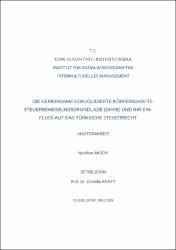| dc.contributor.advisor | Kraft, Cornelia | |
| dc.contributor.author | Aksoy, Neslihan | |
| dc.date.accessioned | 2020-03-06T21:46:54Z | |
| dc.date.available | 2020-03-06T21:46:54Z | |
| dc.date.issued | 2019 | |
| dc.identifier.citation | Aksoy, Neslihan. (2015). Die gemeinsame konsolidierte körperschafts-steuerbemessungsgrundlage (GKKB) und ihr ein-fluss auf das türkische steuerrecht. Türk-Alman Üniversitesi, Sosyal Bilimler Enstitüsü, İstanbul. | en_US |
| dc.identifier.uri | https://hdl.handle.net/20.500.12846/51 | |
| dc.description.abstract | The widely implementation of EU legal harmonization in the internal market ensures the free movement of goods, persons and services. Paradoxically, there is a lack of comprehensive approximation of tax law systems leading to economic misallocation and distortion of competition among the prevailing 28 different taxation systems. Partially aggressive tax avoidance strategies results to the BEPS Action Plan, to whom all OECD states committed. The problematic of taxation of cross-border entrepreneurial activities also affects the process of legal harmonization of candidate countries such as of Turkey. This paper is dedicated to this issue and examines the current draft directive for a Common Consolidated Corporate Tax Base (CCCTB) and the implementation process of the EU candidate country Turkey. The key questions here are whether Turkey should join the two-step introductory model of a CCCTB as an EU candidate country, regardless of the outcome of the accession process and the development of the customs union. A theoretical-analytical approach and a secondary research try to answer the research question. First of all, the need for the CCCTB and the process flow of the draft directive with the degree of complexity was outlined. The specific situation of small and medium-sized enterprises and the potential impact of a CCCTB could be outlined. On this basis, the adjustment process of the existing EU law was shown. The article shows up that an early implementation process of EU law into Turkish national law has economic advantages for Turkey beforehand opening of each chapter. Both in the professional circles as well as on the government side the expectation for the realization of the EU accession persists, but contradictory wise, a deeper treatise on a CCCTB is missing. Nonetheless, it could be argued, even considering a further development of the Customs Union and Turkey's close integration with the EU, and Germany in particular, that a two-step adjustment is beneficial. | en_US |
| dc.description.abstract | Büyük ölçüde AB içinde uyumlu hale getirilen yasalar sayesinde insanların, eşyaların, hizmetlerin ve sermayenin serbest dolaşım özgürlüğünü sağlar. Çelişkili olarak vergi yasalarında uyarlamalar bulunmaz, bu nedenle mevcut 28 farklı vergilendirme sistemi hatalı yardım dağıtımına yol açabilmekte ve rekabet kurallarına aykırı davranışlar oluşturabilmektedir. Gelişmiş vergi kaçırma stratejilerine karşın OECD ülkeleri BEPS Aksiyon Planı‘nı ortaya çıkarmıştır. Uluslararası ticarette vergilendirmenin sorunsal boyutu aynı zamanda Türkiye gibi AB aday ülkelerinin yasa uyumlaştırma sürecini de etkilemektedir. Bu çalışma bu konuyu ele alarak mevcut Ortak Konsolide Kurumlar Vergisi teklif direktifini ve bu direktifin bir AB aday ülkesi olan Türkiye‘deki uygulama sürecini incelemektedir. Bununla ilgili ana mesele; Türkiye’nin bir AB aday ülkesi olarak adaylık sürecinin gidişatına ve gümrük birliğinin genişletilmesine bakılmaksızın, CCCTB’nin iki aşamalı hayata geçirilme modeline eşlik edip etmemesidir. Araştırma sorusuna ilk olarak teorik-çözümsel bir method kullanılarak ve ikincil bir araştırma ile yaklaşılmaya çalışılmıştır. İlk önce, CCCTB'nin gereksinimi ve taslak hazırlanma sürecinin karmaşıklığı gösterilmiştir. Küçük ve orta ölçekli işletmelerin özel durumu ve bir CCCTB'nin potansiyel etkisine bakılmıştır. Buna dayanarak, mevcut AB yasalarına uyum süreci ıncelenmiştir. AB hukukunun Türk ulusal hukukuna erken uygulanma sürecinin, ilgili bölümler açılmadan önce bile, Türkiye için ekonomik faydalar sağladığı gösterilmiştir. Hem mesleki çevrelerde hem de hükümet tarafında AB üyeliğinin gerçekleşmesine dair beklentiler bulunmaktadır fakat çelişkili biçimde bu konuya ve beklentilere dair yapılan derinlemesine makaleler eksiktir. Bununla birlikte, Gümrük Birliği'nin ve Türkiye'nin AB ve özellikle Almanya ile yakın entegrasyonunun daha da geliştirilmesi göz önüne alındığında bile, iki adımlı uyarlamanın avantajlı olduğu söylenebilir. | en_US |
| dc.language.iso | deu | en_US |
| dc.publisher | Türk-Alman Üniversitesi | en_US |
| dc.rights | info:eu-repo/semantics/openAccess | en_US |
| dc.subject | Ortak Konsolide Kurumlar Vergisi (CCCTB) | en_US |
| dc.subject | Common Consolidated Corporate Tax Base | en_US |
| dc.subject | Company taxation | en_US |
| dc.subject | Şirket vergilendirme | en_US |
| dc.subject | Yasa uyumlaştırma | en_US |
| dc.subject | Legal harmonisation | en_US |
| dc.subject | EU accession | en_US |
| dc.subject | AB katılım | en_US |
| dc.subject | Gemeinsame Konsolidierte Körperschaftssteuerbemessungsgrundlage (GKKB) | en_US |
| dc.subject | Unternehmensbesteuerung | en_US |
| dc.subject | Rechtsharmonisierung | en_US |
| dc.subject | EU-Beitritt | en_US |
| dc.title | Die Gemeinsame Konsolidierte Körperschaftssteuerbemessungsgrundlage (GKKB) | en_US |
| dc.type | masterThesis | en_US |
| dc.relation.publicationcategory | Tez | |
| dc.contributor.department | TAÜ, Sosyal Bilimler Enstitüsü, Kültürlerarası Yönetim Ana Bilim Dalı | en_US |
| dc.contributor.institutionauthor | Aksoy, Neslihan | en_US |

















